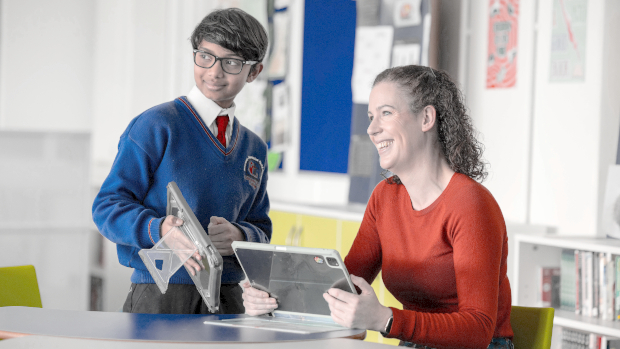
Learnovate and TCD lead Erasmus+ project to help teachers develop digital content creation skills
A new €400,000 European project will help teachers create digital learning content for use in the classroom. The project is a collaboration between Learnovate, a global research and innovation centre in the future of work and learning in Trinity College Dublin (TCD), and the TCD School of Education.
TD3C (Teacher Digital Content Creation Competencies) is co-funded by Erasmus+, the EU and Léargas, the Irish national agency managing programmes in youth work, education, and training.
The use of digital devices in the classroom has become increasingly common in recent times. However, there has not been significant attention to-date on teachers as creators of their own digital educational content. This is despite teachers being required to play a bigger role in providing accessible digital learning content for students, and content creation for learning becoming a priority for the European Commission under the EU Digital Education Plan.
Led by Learnovate and The School of Education in Trinity College Dublin, TD3C brings together schools, universities and research organisations from across Ireland, Portugal, Finland and Italy, to identify the knowledge and skills that enable teachers to create digital learning content in their respective countries, then develop a framework to guide teachers’ content creation.
A small group of teachers across the four countries will be recruited to take part in a small-scale pilot of the framework in February 2025. This will then be followed by recruitment for participants in a much larger trial to start in September 2025, involving 80 teachers and more than 4,000 students.
Along with The School of Education and Learnovate in Trinity College Dublin, the partner organisations are: Edmund Rice College Dublin, University of Jyväskylä (JYU) and Konnevesi High School in Finland, Agrupamento de Escolas Gil Paes and NUCLIO in Portugal, and Instituto Comprensivo Toniolo in Italy.
While TD3C is in its early stages, researchers expect that competencies identified by the project will include the ability of teachers to pinpoint the learning outcomes they wish to achieve with digital content, and the knowledge of how to tailor their teaching and learning approach accordingly.
The TD3C framework will also include guidance on using relevant applications for content creation and modifying off-the-shelf content to suit teachers’ needs, as well as guidance on ethical considerations around copyright and fair use.
“Teachers now have to deal with the increased use of smart and digital devices in the classroom. That means there’s an expectation on teachers to come up with innovative digital teaching resources,” said Learnovate programme manager Deirdre Green.
“The TD3C project is at the core of Learnovate’s research expertise. It is a great opportunity to work with the TCD School of Education and our European partners to really examine the current level of use of digital content around Europe, identify the gaps in teacher competencies, and then feed all that into outputs for the pilot programme beginning in February 2025.”
TCD School of Education and TD3C project lead Keith Johnston said: “Very little work has been done to identify competencies that teachers need to create their own digital content. Similarly, very little has been done to create a framework to guide teachers’ efforts.
“We are working with teachers to create this framework and the approach is about putting teachers front and centre, acknowledging their role in bringing creativity to the project, and working with teachers to develop a process for content creation.
“We’re looking forward to the pilot phase and the recruitment of teachers to trial the outcomes of the project in February 2025, before we roll out the more expansive trial in September 2025. Ultimately we plan to spread the outcomes of the project more widely by sharing the framework and also the teacher education resources among the teacher education community.”
TechCentral Reporters






Subscribers 0
Fans 0
Followers 0
Followers